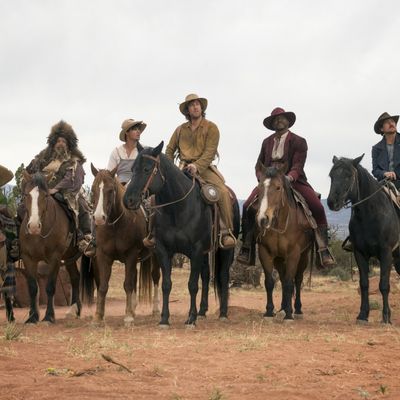
Yesterday Netflix announced that The Ridiculous 6, Adam Sandler’s abysmal Western movie-thing, has been watched more in its first 30 days on the service than any other film during its first 30 days. The. Ridiculous. 6.
Now, the instinct here — and it’s an understandable one because, again, The. Ridiculous. 6. — is to say that Netflix is lying or, more specifically, putting a dizzying spin on its data. Of course they’re saying it’s their most-watched movie, you think. Netflix made it! It’s a Netflix original! They’ve got a stake in this! You’d be making a legitimate point. We have no glimpse into the metrics behind this claim; for all we know, Netflix has been auto-playing the movie on your Apple TV while you sleep. For all we know, nobody has watched The Ridiculous 6. Have you?
But far more likely is that they’re telling the truth. The most important thing is to consider what Netflix is. Then, once we come to terms with that, we have to consider what this means. Because it means something significant, both about filmmaking in general and what Netflix is as a company in particular.
Since Netflix started streaming movies and not just sending them by mail, it’s had an eclectic selection. Netflix licenses movies to stream; it doesn’t own any of this content. At any given time, a movie can disappear or appear on the service based on the unforeseen jockeying of its distributor and Netflix. This happens often, and a cottage industry has sprung up around keeping people availed of what will be entering and leaving Netflix in any given month.
The results of this eccentricity have been interesting. Savvy operators — like the Duplass brothers, Sandler, and the Weinstein Co. — recognized the value of having movies streaming on Netflix in perpetuity, and the Duplassi made their own deal with the site to ensure this. Sandler did the same, except he went even deeper, partnering with Netflix to produce them. The Weinsteins will debut the next Crouching Tiger, Hidden Dragon simultaneously in theaters and on Netflix. Mark Duplass was very blunt about the subject when he said this to Variety:
The most important part of making a movie is making sure that film streams on Netflix. My first movie made a grand total of $220,000 in theaters but about 5 million people have seen it on Netflix because they can click on it and they can try it out. And so I really recommend to get your get goddamn movie on Netflix. It made my career.
But one case in particular stands out. Back in 2012, the Duplass brothers executive-produced a movie called Safety Not Guaranteed. They made it for just $750,000, and Mark acted in it, along with Aubrey Plaza and Jake Johnson. It was directed by a first-timer named Colin Trevorrow. During a limited theatrical run that never reached 200 theaters, it made $4 million — good money for such a cheap film, but nothing that’ll buy anyone an estate in Malibu.
Safety Not Guaranteed then landed on Netflix sometime in early 2013, where it stayed until August 2014. I’ve spoken with multiple filmmakers who stressed that the exposure Safety Not Guaranteed obtained on Netflix transformed their ideas about distribution. For whatever reason — likely a mix of positive responses from audiences and its surprisingly wide-ranging appeal — Safety Not Guaranteed seemed to basically live on the Netflix front page the entire time it was on the service, showing up as a recommendation and in the various category scrolls. Now its director, who had never overseen a movie that cost more than a million dollars prior to 2015, directed Jurassic World, which was briefly the highest-grossing opener of all time. Next up, he will direct a Star Wars movie.
I’m not saying Colin Trevorrow is one of the biggest directors in Hollywood solely because of Netflix. I am, however, pointing out that link. Netflix is a company with enormous power. It now operates in nearly every country in the world, and it was the top-performing stock in the Standard & Poor’s index in 2015, with a market cap of $47 billion — twice that of CBS, as the New York Times points out. Last year, it was reported that Netflix took up 36.5 percent of all internet bandwidth during peak hours in March 2015. That’s more than YouTube, Hulu, and Amazon combined.
Netflix is a major player in media, right alongside, and perhaps above, the networks. To view it as a platform that provides an equal playing field for all movies would be to ignore its most obvious qualities. Just like CBS, NBC, ABC, et al., Netflix has its own product, a product it will spend $5 billion on in 2016 to deliver. Considering those factors, plus the inconsistency of access to specific movies on the service based on licensing and availability, it makes perfect sense that The Ridiculous 6, a film the company advertised aggressively and promotes internally, would find such a massive audience. Would CBS want audiences to see other networks’ shows more than it wants them to see its own?
Of course not, and with the number of movies and TV shows now available to stream, viewers have to be pointed somewhere. Netflix knew what it was doing when it financed this movie, having used its data to discover that viewers around the world loved Adam Sandler. The product didn’t even matter, necessarily. Netflix figured out the system, and it sold us what we wanted without our even realizing it. That’s what Netflix does.

